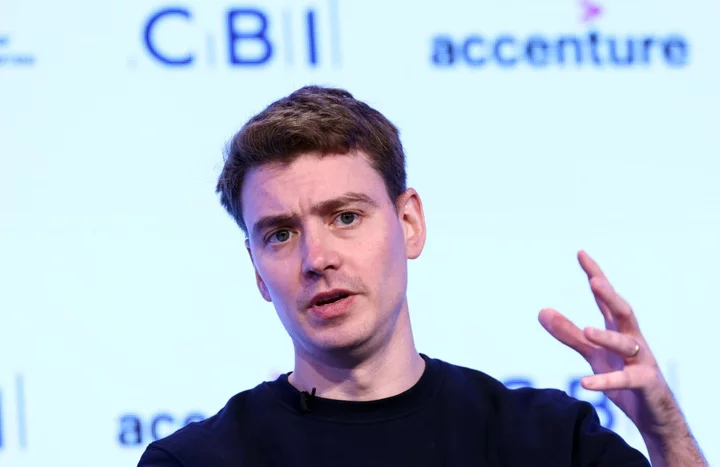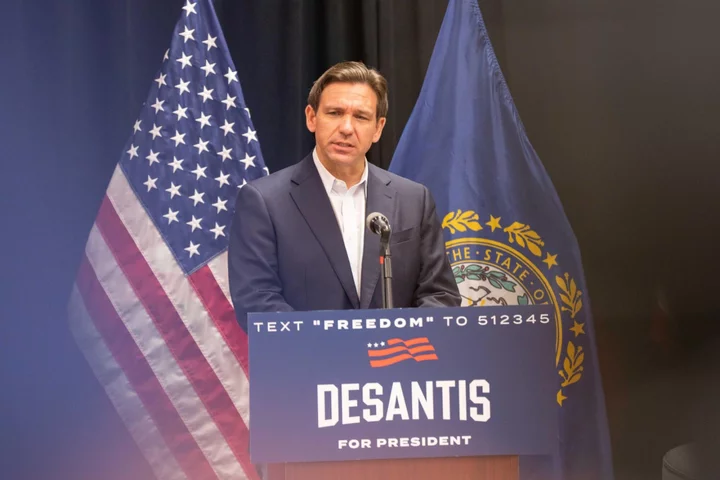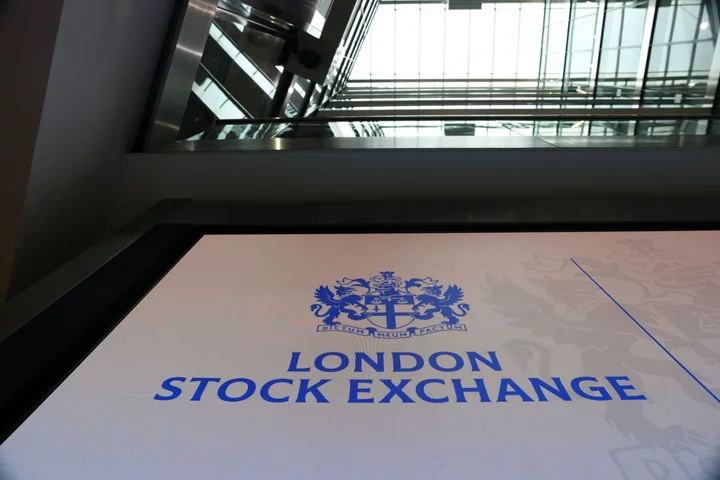As the son of a former prime minister, Euan Blair is unlikely to ever walk into a meeting with a potential employer, investor or politician who doesn’t recognize his name.
But at 39, and the co-founder of $1.7 billion apprenticeship firm Multiverse Group Ltd., Blair is aware of the privilege he was born with. “When your dad’s the prime minister, it’s really easy to believe that anything is possible because he’s just your dad, a regular guy, and he’s running the country,” he says.
Blair and his siblings moved into Downing Street in 1997, when their father, Tony, began what was to be a 10-year-stint as UK prime minister. He attended a state-run school before studying ancient history at Bristol University, and then moving to the US to study international relations at Yale. A graduate job at Morgan Stanley followed.
It was there he had a realization. The other graduates were “nearly all White men” from privileged backgrounds with liberal arts degrees. “We had no divine right to be there,” says Blair.
Today, Blair is on a mission to disrupt this traditional route to jobs in companies such as Microsoft Corp, Citigroup Inc — and Morgan Stanley. His big idea? Apprenticeships. But not the ones that would have been popular in decades gone by. Multiverse offers on-the-job training in data skills, software engineering, and business transformation. The plan is for apprentices to be hired on the basis of aptitude rather than academic grades.
By ditching the need for a university degree to secure a job, Blair wants firms to reject the idea of “outsourcing who gets access to the best jobs to a tiny handful of elite institutions that are not representative of society.”
The initial results appear to be promising. Two thirds of early-career apprentices at the companies Multiverse works with come from Black, Asian, or multiple ethnicity backgrounds. A third have qualified for free meals at some point during their time at school. Multiverse charges the company £1,500 ($1,934) for each hire, then gets paid to provide training through the Apprenticeship Levy, a pot of cash that any company with 250 employees or more must pay into by law.
Multiverse has secured the backing of big investors such as GV, previously known as Google Ventures, General Catalyst — which has backed Airbnb and Deliveroo — and Index Ventures. It last raised $220 million in June last year at a valuation of $1.7 billion, which saw members of the Walton family, famous for Walmart, make an investment.
Skills gap
Despite recent data from Reed Recruitment showing that graduates preparing to leave university face a tough jobs market, Blair says that Multiverse is seeing no sign of a fall in demand.
A third of apprentices get a promotional pay increase while they’re still on their program and “tend to get better performance reviews than graduates.” Why? Multiverse is looking for “grit”, he says. “Let’s call it resilience.”
In addition to younger apprentices, retraining existing employees is one of the fastest-growing parts of the business, as companies try to adjust to a growing demand for data skills — but with a workforce that is unsuited to the shift.
Multiverse, which has 10,000 current apprentices and alumni who have worked with 1,000 businesses, is training fast food workers, cashiers and line cooks in how to become data analysts and software engineers.
“The main thrust around re-skilling is taking people from hourly into salaried roles,” Blair says.
Preparing the existing workforce for the jobs of tomorrow is a task which is preoccupying education technology businesses such as Pearson Plc. Andy Bird, Pearson’s chief executive officer, has shifted the company’s focus to up-skilling and re-skilling, and the World Economic Forum has said that more than one billion people will need retrained by 2030.
For employers, the benefits are obvious. Companies are searching for ways to use generative AI and automation to drive efficiencies — and ultimately replace jobs.
Multiverse tries to identify people most at risk of losing their jobs over the next three years, providing tech training for them in a bid to avoid an expensive wave of firing and rehiring. “It’s a hell of a lot cheaper to bring in people through that route than it is to go external,” says Blair.
IPO
Tony Blair said in an interview with Bloomberg TV in May that a possible stock market listing of Multiverse was still “some way off,” and Euan Blair says there are no live discussions. “We’re fortunate, we’ve got a lot of cash on the balance sheet.” According to its most recent results for the year to March 2022, posted on Companies House, Multiverse had £81.3 million of cash, while it made revenues of £27.2 million — up from £10.1 million a year earlier.
It also posted the sixth consecutive year in the red, losing £7.6 million. Blair says Multiverse is still in its growth stage. “Having a sound underlying business is important. We have those things.”
He adds: “The fact is no business should expect to be unprofitable forever, but it’s very acceptable if you have a lot of cash in the bank to invest in growth.”
He says some existing degrees are leaving graduates ill-equipped for the workplace. “Computer science degrees do not have a very good employment rate in the UK despite the fact that we massively need more software engineers,” he says. “And part of the reason for that is they’re not teaching you in a practical environment how to be a successful programmer.”
Blair now wants graduate schemes to be replaced by programs that are open to graduates non-graduates alike.
Blair’s mission to provide an alternative route into the job market is at odds with his father, who as prime minister set a 50% target for young people to go to university — believing this would aid social mobility. Today, the younger Blair says it “just hasn’t worked out like that.” He points to data showing that just 4% of UK children who are eligible for free school meals secure entry to one of the Russell Group of leading UK universities. According to government statistics, 23.8% of children in the UK are eligible for free school meals.
“Your background should not define your destination,” he says. “The problem is, too often it does.” As if to prove the point, Blair insists that despite his strong views on education, social mobility and the workplace, he is in “no way interested” in a career in politics.









